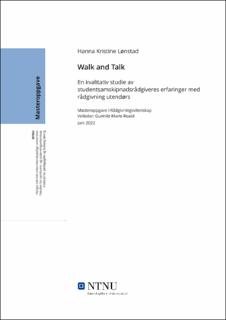| dc.description.abstract | I 2021 rapporterte nesten halvparten av studentene som deltok i Studentenes helse- og trivselsundersøkelse (SHoT) om et høyt nivå av psykiske plager (Sivertsen, 2021, s. 2). Koronapandemiens strenge restriksjoner var en av årsakene til at hverdagen opplevdes mer krevende (Sit, 2020). Som et resultat av dette, utvidet Norges studentsamskipnader sine tjenester. Blant annet innførte flere et rådgivningstilbud utendørs, gjerne presentert som walk and talk (Samskipnaden, 2021; Sit, 2020; Waula, u.å.). Formålet med denne studien er å undersøke slik praksis nærmere, da oppgaven søker å svare på følgende problemstilling: Hvordan erfarer studentsamskipnadsrådgivere bruk av walk and talk i sin rådgivningspraksis?
For å belyse studiens problemstilling, ble det gjennomført individuelle semistrukturerte intervjuer av fem rådgivere fra to studentsamskipnader. Forskningsdeltakernes erfaringer med konseptet strakte seg fra å ha gjennomført to walk and talk-samtaler, til flere år med erfaring. Studiens vitenskapelige ståsted er fenomenologisk, og i analysearbeidet ble det hentet inspirasjon fra den fortolkende fenomenologiske analysemodellen (Interpretative Phenomenological Analysis, IPA).
Analysearbeidet resulterte i tre fremtredende funn. Den første kategorien, «Naturen som støttespiller», henviser til rådgivernes erfaringer med at naturen kan fungere som en støttespiller i deres rådgivningsarbeid. Den andre kategorien, «Utjevning av makt», representerer forskningsdeltakernes opplevelser av at maktforholdet mellom rådsøker og rådgiver utjevnes idet rådgivningen flyttes utendørs. Den siste kategorien, «Endrede betingelser skaper andre typer utfordringer», viser til deltakernes erfaringer med at det oppstår utfordringer knyttet til lytting, lesing av kroppsspråk, diskresjon og oppmerksomhet når samtalene flyttes ut.
I oppgavens drøftingsdel, settes disse funnene i sammenheng med Berger (2017) sin «nature therapy», Rogers (1979) sin personsentrerte teori og teori om hva god og profesjonell rådgivning kan innebære. Av drøftingens hovedpoenger kan en trekke frem viktigheten av å velge passende lokasjoner for samtaler som skal holdes utendørs. I tillegg stilles det spørsmål ved walk and talk-konseptets definisjon og fleksibilitet, og det presenteres et dilemma om hvem sine preferanser som skal etterfølges i walk and talk-relaterte beslutninger: Er studentenes økte medbestemmelse nyttig, dersom det går negativt utover rådgivers opplevelse av å kunne gjøre en god jobb? I den sammenheng, blir rådgivers viten om seg selv beskrevet som avgjørende for om rådgivningen blir vellykket eller ikke.
Omfanget av denne studien har vært begrenset. Til tross for dette, kan oppgaven trolig anses som et bidrag til utvikling av fagområdet, da forskningsfeltet som tar for seg rådgivning utendørs er relativt lite. | |
| dc.description.abstract | In 2021 almost half of all the student participants of the SHoT survey reported significant struggles with their mental health (Sivertsen, 2021, s. 2). The strict restrictions imposed in response to the Coronavirus pandemic was cited as one of the reasons why everyday life was experienced as more difficult than normal (Sit, 2020). In order to address these issues, Norway’s student welfare organisations decided to expand their services. One such extension, used by several of the organisations, is the provision of counselling sessions outdoors, often presented as “walk and talk” (Samskipnaden, 2021; Sit, 2020; Waula, u.å.). The aim of this study is to examine such practices in response to the following question: How do the counsellors of Norwegian student welfare organisations experience the use of walk and talk in their counselling practice?
To investigate this issue, individual semi-structured interviews of five counsellors from two student welfare organisations were conducted. The research participants’ background with the concept varied, with some having conducted only two walk-and-talk sessions, whereas others had up to several years of experience with the approach. The scientific standpoint of the study is phenomenological, and inspiration for the analysis was found in the Interpretative Phenomenological Analysis (IPA).
The analysis resulted in three prominent findings. The first category, “Nature as a supporter”, refers to experiences of counsellors suggesting that nature can play an important supplementary role to their services. The second category, “Equalization of power”, signifies the fact that participants indicated that moving the counselling outdoors resulted in an equalisation of the power dynamics between counsellor and the counselee. The final category, “Change in conditions create different types of challenges,” reflects the experiences that new challenges arise when the dialogue is moved outdoors, related to listening, interpreting body language, discretion, and attention.
In the discussion section of the paper, these findings are considered in relation to Berger’s (2017) “nature therapy”, Rogers’ (1979) person-centred theory, and theories regarding what well performed counselling might involve. It is worth highlighting the importance of choosing an appropriate location for the conversations that are carried out outdoors. Additionally, the definition and flexibility of the “walk and talk” concept is questioned, and a dilemma concerning whose preferences ought to be prioritized in walk and talk decision making is raised: is the students’ increased participation in the decision-making process useful, if it negatively impacts the perceived ability of the counsellor to satisfactory do their job? In this context, the counsellor’s knowledge of self is described as critical for the success of the counselling.
Despite the limited scope of the findings, the present paper can be viewed as a contribution to the development of the related theory within the field, as the literature concerning outdoor counselling is relatively small. | |
